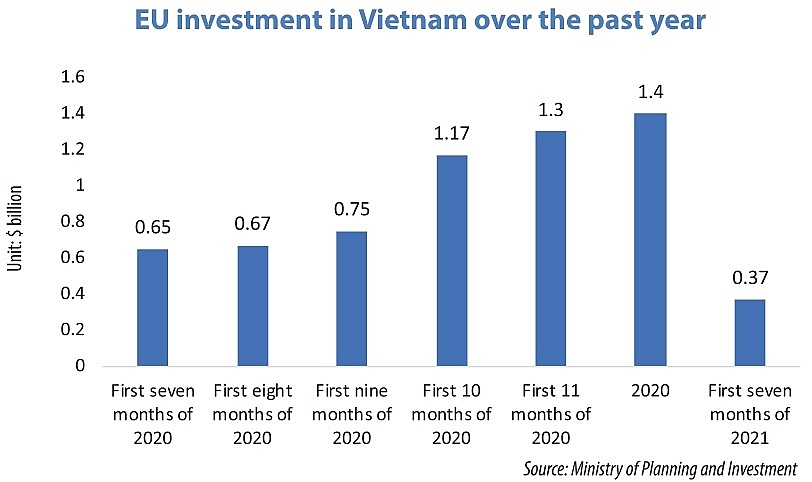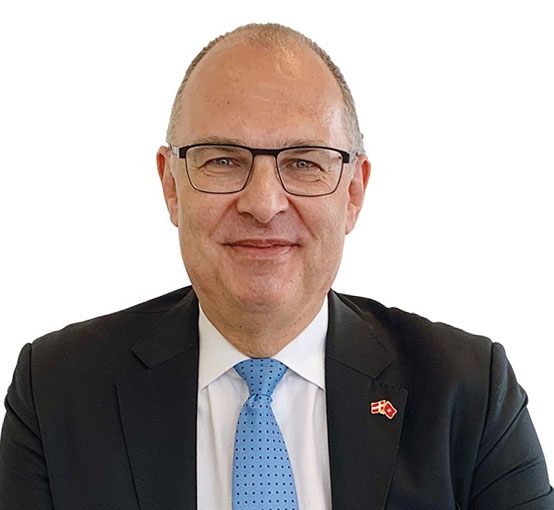Progress made for investment from EU with free trade deal
 |
In early August, the Vietnam Chamber of Commerce and Industry and the Netherlands Embassy in Vietnam signed an action programme of the Vietnam-Netherlands Business Platform for the Mekong River Delta, aiming to expand trade and investment in areas such as sustainable agriculture, water management, logistics, and renewable energy.
The Netherlands is the largest EU investor in Vietnam by value, and contributions from this country continuously increased over the past year. As shown in statistics from Vietnam’s Ministry of Planning and Investment (MPI), before the enforcement of the EU-Vietnam Free Trade Agreement (EVFTA), the total Dutch investment in Vietnam amounted to over $360 million in the first seven months of 2020. The figure rose since last August when the agreement came into force, reaching nearly $900 million last year.
The agreement opens market access for EU investments in other many sectors and industries, from higher education to telecommunications. Since its enactment, 65 per cent of EU exports to Vietnam, together with 71 per cent of Vietnamese exports to the EU, became tariff-free.
Many other EU investors like Germany, France, Spain, and Denmark have also hiked their investments in Vietnam to diversify their supply and value chains.
French investment in Vietnam was nearly $103 million between January and July 2020 and increased to $135 million at the end of that year. German investment rose to nearly $150 million in 2020.
Marko Walde, chief representative of the Delegation of German Industry and Commerce in Vietnam, said that Vietnam has developed into an attractive investment location. Today, more than 500 companies from Germany have invested roughly $2.7 billion in Vietnam.
“German investors could bring their well-known technology in management and training to this country, allowing more value-added production and less waste of resources,” he told VIR.
According to the European Chamber of Commerce in Vietnam (EuroCham), almost two-thirds of companies benefited from the EVFTA in consumer goods, construction, clean energy, e-commerce, and more. The bloc’s investment in Vietnam rose to nearly $1.4 billion by late 2020, according to the MPI.
While the latest wave of COVID-19 in Vietnam caused more issues than any previous one, European business leaders remain confident about the prospects of their companies, with more than half of them anticipating an improved or neutral performance in Q3, and 80 per cent planning to maintain or increase their headcount and investment, said a EuroCham report.
In fact, EU investment in Vietnam remains lower than expected, and lags behind other foreign investors like South Korea, Singapore, and Japan. More prospects are expected on the back of the EU-Vietnam Investment Protection Agreement (EVIPA) that is slated to come into force once it has been ratified in each EU member state.
Walde elaborated, “German companies expect the EVFTA and the EVIPA to improve economic policy in Vietnam in the long run. They could enjoy protection of investments with trade facilitations here.”
He added, “The simultaneous implementation of the EVFTA and the Comprehensive and Progressive Agreement for Trans-Pacific Partnership will help Vietnam’s GDP increase by up to 3.2 per cent in this decade. Vietnam will become a strategic investment destination in the process of restructuring the global and regional supply chain, and a high-potential domestic market to attract international corporations.”
Together with the EVFTA, the EVIPA will help align Vietnam with international standards and practices, and further integrate the country into the global economy by introducing reformed and modern investment protection rules.
This will further encourage European investment in Vietnam. As included in the EVIPA, more precise standards on investment protection mean that the government must respect five fundamental principles – provisions on non-discrimination; allowing investors to transfer or repatriate investment-related funds; prompt and adequate compensation in cases of expropriation; a commitment to fair and equitable treatment; and a guarantee that contractual and legal obligations towards investors will be honoured.
| Kim Hojlund Christensen - Danish Ambassador to Vietnam
We have seen a real positive trend in investment activities from Danish investors in Vietnam. In the first half of 2021, Denmark’s total registered investment capital in Vietnam reached $16.77 million – a 16-fold increase compared to the same period last year. World-leading Danish companies have set up their legal entities in Vietnam to develop multi-billion-dollar wind power projects. We are confident that once Vietnam’s regulatory framework for the wind sector is fully in place, more Danish wind developers and companies in the supply chain will choose Vietnam. The EVFTA has enhanced bilateral trade and investment cooperation between Denmark and Vietnam. The tariff elimination is a significant contribution to this. Due to COVID-19 and volatile global trade, liberalisation of customs duties has become even more important, allowing Danish and Vietnamese companies to save substantial expenses, and creating more business opportunities for both sides. This success also proves that Vietnamese companies have successfully improved their product quality to meet the high standards set out in the EVFTA. And apparently, more and more Vietnamese products have gained access to the Danish market. Alain Cany - Chairman, EuroCham
Overall, the first 12 months of the EVFTA have been a success. For instance, in the first six months of 2021 alone, the value of EU-Vietnam trade in goods reached $27 billion – an increase of more than 18 per cent on the same period in 2020. Moreover, even when Vietnam’s legal framework was not aligned with the tariff reduction schedule, the government back-dated the duties paid so that companies were able to claim the reduced tariffs as agreed. The most common challenge reported so far has been administrative procedures. Just over one-third of business leaders highlighted concerns about customs and import-export processes. Meanwhile, one-fifth report difficulties around technical barriers to trade, and just under 10 per cent mentioned issues involving Vietnam’s infrastructure. The prospects for European investment depend, in large part, on how long the current pandemic wave lasts. Therefore, we urge the government to accelerate its ambitious vaccination rollout to boost EU investment. Once the pandemic is brought under control, our economies need to reopen and recover. And, just as vaccines will help to combat this global health crisis, free, fair, and rules-based trade will help to combat the global economic crisis. Pham Hoang Hai - Executive director, Italian Chamber of Commerce in Vietnam
As yet, we have not seen a big change in investment activities from Italian companies in Vietnam in the past year. While the EVFTA is a boost for trade and investment for both sides, we also have to take the pandemic effects into consideration over the last 19 months, from the supply chain and investment strategy to financial structure and consumer behaviours. Before the pandemic, we were expecting the so-called first wave of Italian investment switching from other Asian countries into Vietnam, and especially from China, but we still have to wait further to understand how the investment flow will really evolve. To specify, this investment flow is not simply closing factories in other countries to open anew in Vietnam, but rather opening new factories here and integrating them with the others. Trade exchange between Vietnam and Italy increased from €2.3 billion ($2.7 billion) in 2012 to €4 billion ($4.7 billion) in 2016. And even last year our trade exchange reached €3.7 billion ($34 billion) and we’re pretty sure that the trade flow will surpass 2016 levels by the end of 2021. Even if Italy has not yet been a major funder in Vietnam, every Italian investment we have here is high in quality. |
What the stars mean:
★ Poor ★ ★ Promising ★★★ Good ★★★★ Very good ★★★★★ Exceptional
Themes: EVFTA & EVIPA
Related Contents
Latest News
More News
- VNPAY and NAPAS deepen cooperation on digital payments (February 11, 2026 | 18:21)
- Vietnam financial markets on the rise amid tailwinds (February 11, 2026 | 11:41)
- New tax incentives to benefit startups and SMEs (February 09, 2026 | 17:27)
- VIFC launches aviation finance hub to tap regional market growth (February 06, 2026 | 13:27)
- Vietnam records solid FDI performance in January (February 05, 2026 | 17:11)
- Manufacturing growth remains solid in early 2026 (February 02, 2026 | 15:28)
- EU and Vietnam elevate relations to a comprehensive strategic partnership (January 29, 2026 | 15:22)
- Vietnam to lead trade growth in ASEAN (January 29, 2026 | 15:08)
- Japanese business outlook in Vietnam turns more optimistic (January 28, 2026 | 09:54)
- Foreign leaders extend congratulations to Party General Secretary To Lam (January 25, 2026 | 10:01)




 Tag:
Tag:




















 Mobile Version
Mobile Version